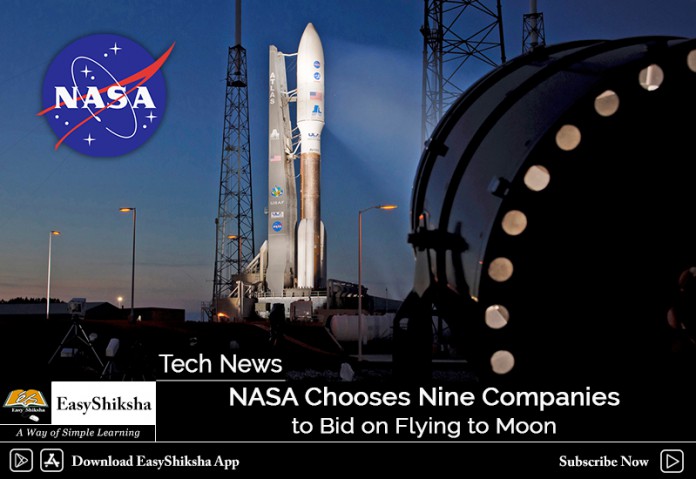The US space agency on Thursday declared nine private companies, mostly start-ups, that will bid $2.6 billion (approximately Rs. 18,100 crores) in connections to construct spacecraft to carry payloads to the Moon as soon as 2019.
The move is part of NASA’s goal of sending people to the Moon in the next ten years, for the first time since the Apollo era of the 1960s and’70s.
NASA Administrator Jim Bridenstine described the announcement as”tangible progress in America’s return to the Moon’s surface to remain.”

Important Announcement – EasyShiksha has now started Online Internship Program “Ab India Sikhega Ghar Se”

Of this group, the sole famous name is aerospace giant Lockheed Martin, with a long reputation for success with NASA and built up the InSight lander which touched down Monday on Mars.
Others are Astrobotic Technology, Inc.; Deep Space Systems; Draper; Firefly Aerospace, Inc.; Intuitive Machines, LLC; Masten Space Systems, Inc.; Moon Express; and Orbit Beyond.
“The industrial Lunar Payload Services contracts are still an indefinite delivery, indefinite quantity contracts with a combined maximum price value of $2.6 billion during the next 10 decades,” said a NASA statement.
NASA has not given any details for the bidding process, other than to state it will”look at lots of variables when comparing the bids, including technical feasibility, cost, and schedule.”
The decision marks a stark change in NASA’s manner of operation once it comes to America’s Moon ambitions — though private companies are used for many years to ferry equipment to the International Space Station, and SpaceX and Boeing are working on spacecraft to carry astronauts to the Moon as early as 2019.
Rather than conducting a government-funded space program, like Apollo, the US space agency will purchase solutions, essentially turning into a client to personal businesses that build their own spacecraft.
Top Software Engineering Courses
The approach will allow NASA to cut costs, Bridenstine explained.
Earlier this year, NASA stopped its only autonomous car under development to learn more about the surface of the Moon, known as the Resource Prospector (RP) mission.
The vehicle was in development for around a decade to explore a polar region of the Moon.
NASA’s current plan is to begin by sending gear into the Moon and create an orbiting lunar station starting in 2022.
By 2023, the very first rocket would carry astronauts across the Moon, in a much more distant orbit than the Apollo missions.
Landing actual astronauts on the Moon likely will not occur before the end of the 2020s, NASA has said.
Empower your team. Lead the industry
Get a subscription to a library of online courses and digital learning tools for your organization with EasyShiksha
Request NowALSO READ: oppo-india-md-steps-down-amid-mounting-losses
Get Course: Basic-Computer-Skills-Certification





































































